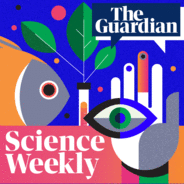Psychologists usually expect ambivalence to be a driver of political apathy. But a new study appears to show a link between ambivalence in our views and the likelihood that we’ll support extremist actions. Madeleine Finlay speaks to the study’s co-author Richard Petty, professor of psychology at Ohio State University, to find out what pushes people to take extreme actions, how politics could be driving this behaviour and how it could be combated. Help support our independent journalism at theguardian.com/sciencepod

Wissenschaft & Technik
Science Weekly Folgen
Twice a week, the Guardian brings you the latest science and environment news
Folgen von Science Weekly
299 Folgen
-
Folge vom 27.06.2024The surprising psychology behind extremism, and how politics is driving it
-
Folge vom 25.06.2024The infection that affects half of women and its link to antibiotic resistanceAnyone who has had a urinary tract infection knows how agonising they can be. Some infections go away on their own, but many need antibiotics. Beneath the surface of this very common infection lie many mysteries, unanswered questions, and unnecessary suffering. And it gets to the heart of the challenge of tackling antimicrobial resistance. Madeleine Finlay speaks to Dr Jennifer Rohn, head of the centre for urological biology at University College London, about what we now understand about how UTIs take hold, and the complexity surrounding their treatment. Help support our independent journalism at theguardian.com/sciencepod
-
Folge vom 20.06.2024A black hole awakens and why some people avoid Covid: the week in scienceIan Sample and science correspondent Hannah Devlin discuss some of the science stories that have made headlines this week, from a glimpse of a black hole awakening, to a new blood test that can detect Parkinson’s seven years before symptoms appear, and a study exploring how some people manage to avoid Covid infection. Help support our independent journalism at theguardian.com/sciencepod
-
Folge vom 18.06.2024What are the main UK parties promising on climate and is it enough?Last week more than 400 scientists signed an open letter to political parties urging ambitious action on the environment to prevent making Britain and the world ‘more dangerous and insecure’. Now that the main parties’ manifestos have all been released, Ian Sample is joined by the global environment editor, Jon Watts, and the biodiversity reporter, Phoebe Weston, to find out what the manifestos have to say about nature and climate, and whether anyone is promising the level of action scientists are asking for. Help support our independent journalism at theguardian.com/sciencepod
